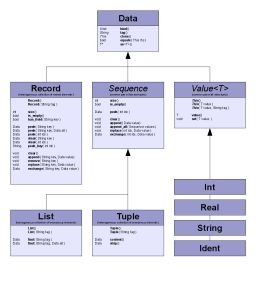| |||
| |||
|
Contact: |
DownloadsDownload whole package (C++, C#) from Sourceforge: Harpoon-5.8....zip (New: Types are implemented in C++ (beta version)). UsageThese libraries are quite simple and easy to use. For example, to read information from file "sample.hrp" containing: Person( name = "John" age = 28 ) one should use a code similar to this: try { Record* data = deserialize_from_file( "sample.hrp" )->as< Record >(); string name = data->peek("name")->as< String >()->value(); int age = data->peek("age")->as< Int >()->value(); delete data; } catch ( Error& er ) { printf("ERROR: %s\n", er.msg.c_str() ); } For more information see the readme.txt file, or see the pseudo class diagram: Types(beta version) There are two functions declared in Types.h:
The functions take a data pointer, a type (optionally), a type dictionary and a list of type errors (to be fed). bool check_types( const Data* data, const Record* type, const TypeDictionary& dict, std::list<TypeError>& errors );
bool impose_types( Data*& data, // or std::auto_pt<Data> const Record* type, const TypeDictionary& dict, std::list<TypeError>& errors ); Parameter type is optional - without it the functions will check types accordingly to the data tags. The type dictionary has to be created first. For example: // Prepare a type dictionary TypeDictionary dict; // Add types from a file dict.add( deserialize_from_file("types.hrp")->as< List >() ); // Get main type const Record* root_type = dict.find("Document"); // Prepare list of type errors std::list < TypeError > errors; // Invoke type checking if ( check_types( data, root_type, dict, errors ) ) { ... } For more details see the Types.h file. |
||
